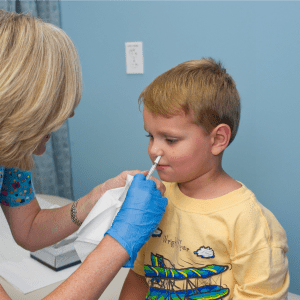Public health chiefs have announced they are confident that the nasal flu vaccine used by GPs for the childhood flu vaccination programme is effective, after media reports the vaccine has failed to protect children against flu in the US.
In a statement, Public Health England (PHE) said provisional figures showed that the nasal vaccine spray was effective ‘both at protecting children themselves and their communities’.
The statement added: ‘Reports from the US have suggested a possible lower vaccine effectiveness, unlike the findings in the UK.’
PHE recently confirmed use of the children’s nasal flu vaccine for the 2016 to 2017 flu vaccination programme.
Dr Richard Pebody, head of flu surveillance for PHE said: ‘We estimate that overall, the vaccine was 57.6% effective in preventing influenza infection amongst children in 2015 to 2016.
‘These findings are encouraging and in line with what we also typically see for the adult flu vaccine.’
Dr Pebody added: ‘Based on intelligence to date, there is no reason to change current recommendations regarding use of the children’s nasal spray vaccine in the UK.’
AstraZeneca, which manufactures the nasal flu vaccine – which unlike injectable versions is a live attenuated influenza vaccine (LAIV) – said in a statement: ‘AstraZeneca are pleased that independent data from the 2015/16 flu season in the UK and elsewhere has demonstrated effectiveness of LAIV.
‘The most recent available data (2014/15) on the childhood influenza vaccination programme has also shown an encouraging impact for the UK population. We will continue to work with public health bodies in the US to better understand their contrasting data.’
Pulse October survey
Take our July 2025 survey to potentially win £1.000 worth of tokens












